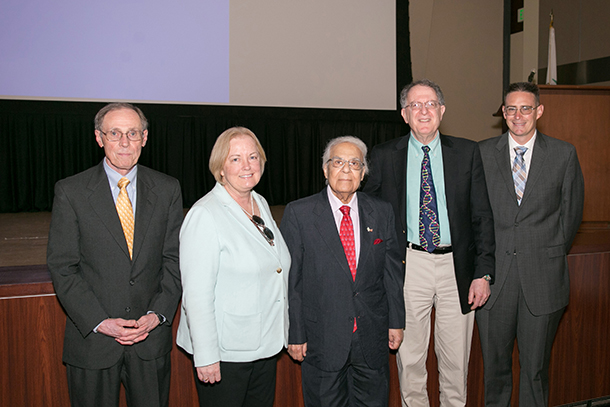The microbiome — microbes that comprise an ecosystem, either internal or external to a biological host — was the topic of the 2017 Massry Prize Lecture, delivered Oct. 5 on the Health Sciences Campus by the winners of this year’s prize.
Norman R. Pace, PhD, of the University of Colorado, Boulder, called microbiomes “one of the least understood, yet most important aspects of the global ecosystem.” Pace presented examples of microbiomes in indoor environments. Some, in locations such as swimming pools and bathrooms, contain microbes that may cause ailments including non-tuberculous mycobacteria pulmonary disease, which affects from 100 in 100,000 to more than 500 in 100,000 people in the United States. Infections at that rate are considered an epidemic level.
“That is a serious disease and it’s all over the place,” Pace said, giving the crowd a personal connection to his research. “I am sure that there are people with this disease out here in the audience.”
Rob Knight, PhD, of the University of California, San Diego, spoke about his work to perform microbial gene sequencing on a large scale. This was a necessary step in the study of microbiomes because, as Knight stated, “There are 100 million times as many bacteria on Earth as stars in the universe.”
“Microbiology,” he said, “is the ultimate big data science.”
Jeffrey I. Gordon, MD, of Washington University School of Medicine in St. Louis, spoke of his work to discern the influence of the human gut microbiome — which is sometimes referred to as an organ itself — on obesity and childhood malnutrition. Starting with germ-free mouse models in the lab, Gordon’s team has moved on to working with children in Bangladesh and Malawi. The first study is nearly complete, using a nutritional supplement specifically designed for the environment where these children live.
“At this point in time we have a human biological study that will allow us to determine whether we can repair this immature organ.” Gordon said. “We’ll learn a lot from these studies about the interactions between healthy growth of a microbiota and healthy growth of children.”
The Meira and Shaul G. Massry Foundation established the annual Massry Prize in 1996 to recognize contributions to the biomedical sciences and the advancement of health. Fifteen Massry prize winners have gone on to win the Nobel Prize, including the winners of the 2017 Nobel Prize in Physiology or Medicine, who were awarded the Massry Prize in 2012.
The lecture can be viewed at http://bit.ly/massry2017.
— Amanda Busick


